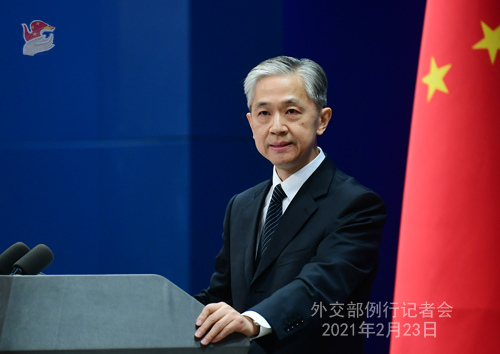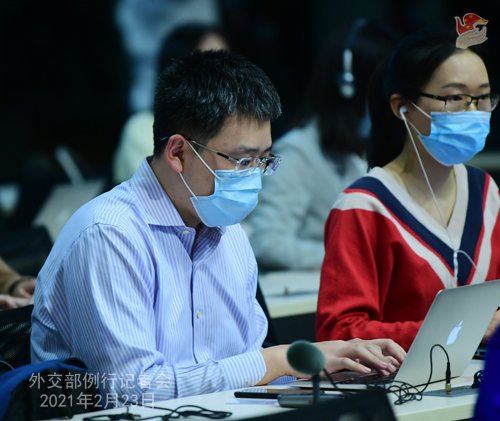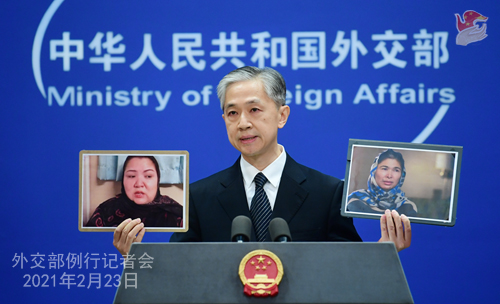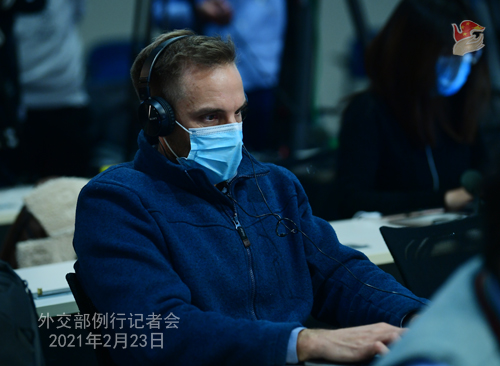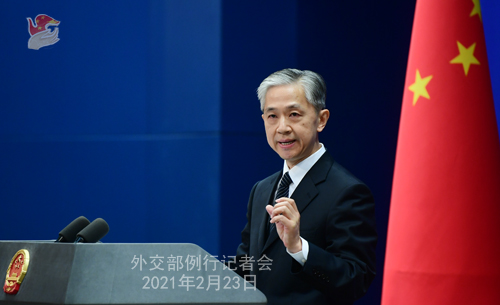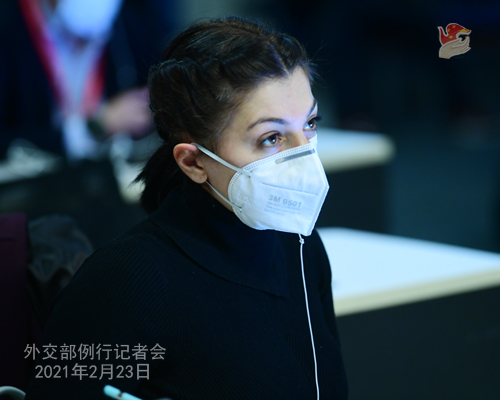| Foreign Ministry Spokesperson Wang Wenbin's Regular Press Conference on February 23, 2021 |
| 2021-02-24 00:11 |
|
Reuters: Responding to comments made by Wang Yi yesterday, US State Department Spokesman Ned Price told reporters that Wang's comments reflect the continued pattern of Beijing's tendency to avert blame for its predatory economic practices. What's the ministry's comment? Wang Wenbin: To quote State Councilor Wang Yi from his opening speech at the Lanting Forum, "In the past few years, China-US relations deviated from the normal track, and ran into the biggest difficulties since the establishment of diplomatic ties. The root cause was that the previous US administration, out of its own political needs, seriously distorted China's future path and policy, and on that basis, took various measures to suppress and contain China, which inflicted immeasurable damage to bilateral relations." As for the specific accusations made by the US side, we have expounded our positions on many occasions, with facts and figures. People upholding objectivity will be able to come to an objective and fair conclusion. It is hoped that the US side will bear in mind the interests of the two peoples and people around the world, adopt a positive and constructive policy towards China, work with China to focus on cooperation, manage differences, and bring China-US relations back to the track of sound and stable development. AFP: EU foreign ministers have agreed to sanctions against Myanmar's military over its coup this month and to withhold some developmental aid over the weekend. After that and the UN condemnation of Myanmar's military, has there been any change in China's position on the situation in Myanmar? Wang Wenbin: As Myanmar's friendly neighbor, China hopes that all parties in Myanmar will handle differences within the constitutional and legal framework to safeguard political and social stability. Any action taken by the international community should be conducive to Myanmar's political and social stability, its peace and reconciliation, and avoid aggravating conflicts and further complicating the situation. Bloomberg: The UN Secretary General Guterres in a tweet says that coups have no place in our modern world. My question is, does China agree with the secretary general's characterization of the situation in Myanmar? Is it a coup in China's eyes? Wang Wenbin: We have repeatedly talked about our position on what's happening in Myanmar. China hopes that parties in Myanmar will put people's will and interests first and properly handle differences within the constitutional and legal framework through dialogue to safeguard political and social stability. HRTN: Director of Johns Hopkins University's China-Africa Research Initiative (CARI) said that after reviewing extensive data on Chinese lending in Africa, they found no evidence that China seizes the assets of other countries if they fail to pay loans. Do you have any comment on this? Wang Wenbin: I read the reports. Not long ago, The Atlantic also published an article titled The Chinese 'Debt Trap' Is A Myth, citing a lot of evidence that proves "the Chinese 'debt trap'" is a deliberate lie made by some Western politicians. China has repeatedly stated our position on the debt issue. If we break down African countries' foreign debt, multilateral financial institutions and commercial creditors hold more than three-quarters of the total, and so bear a greater responsibility for debt relief. Not a single African country had debt difficulties due to its cooperation with China. When African countries have economic problems, China is always ready to find proper solutions through friendly consultation. We never press countries having difficulties on debt repayment, not to mention asking them to sign any imparity clauses. In the meantime, China attaches high importance to debt suspension and alleviation in Africa. We are following the consensus reached by Chinese and African leaders and the G20 DSSI and actively responding to Africa's concerns. We have signed debt relief agreements or reached debt relief consensus with 16 African countries. Under the FOCAC framework, China also waived interest-free loans due to mature by the end of 2020 for 15 African countries. "The Chinese 'debt trap'" is a false allegation, but it is true that some people are sowing discord between China and Africa with ill intentions. Anyone with an objective mind will come to a fair conclusion on that. China's cooperation with Africa always follows the principle of sincerity, real results, affinity and good faith, the principle of pursuing greater good and shared interests, the principle of openness, transparency, equality and mutual benefit, and the principle of extensive consultation, joint contribution and shared benefits, which has effectively advanced Africa's economic and social development and the improvement of livelihoods. China has helped Africa in constructing over 6,000 kilometers of railways, 6,000 kilometers of highways, nearly 20 ports and over 80 large-scale power facilities. China invested in the construction of Nigeria's Lekki Deep Water Port Project and Kenya's Nairobi Expressway, expanding China-Africa investment and finance cooperation and contributing to Africa's independent and sustainable development. China-Africa cooperation has been upright and aboveboard, delivering tangible outcomes to both sides. Developing countries' debt issue is a long-standing and complicated one, and the fundamental solution is to assist and support these countries in enhancing development capabilities to realize better growth. China has been committed to fostering a favorable international environment for developing countries and realizing common development through cooperation. China is ready to continue working with the international community for the debt suspension and alleviation in Africa. We hope developed countries and major international financial institutions can take into account African countries' concerns and exert more efforts in their debt relief. Kyodo News: I noticed that both you and Foreign Minister Wang Yi have said that China provided vaccine assistance to 53 developing countries that have requested it. My first question is to confirm whether all the assistance is free of charge. My second question, is it that some of the assistance has not been completed and the delivery of the aid is still going on? Then, if so, how many countries have already received Chinese vaccines and how many doses have been delivered to date? Wang Wenbin: China was the first country that pledged to make vaccines a global public good. We are providing free vaccines to 53 countries in need while overcoming our difficulties at home. As far as I know, vaccines provided by China to Pakistan, Cambodia, Laos, Equatorial Guinea, Zimbabwe, Mongolia and Belarus have arrived in these countries. We are also exporting vaccines to 27 countries that are willing to buy Chinese vaccines. Among them, vaccines for Serbia, Hungary, Peru, Chile, Mexico, Colombia, Morocco, Senegal, Indonesia, the United Arab Emirates and Turkey have already arrived in these countries. The vast majority of these countries are developing ones. We hope that all capable countries will join hands in supporting the international community, developing countries in particular, in fighting the pandemic. China will continue to carry out vaccine cooperation with other parties within its capacity to help the international community overcome the pandemic at an early date.
The Globe and Mail: The Canadian parliament unanimously passed a motion on "genocide" in Xinjiang and called for the movement of the 2022 Olympics away from Beijing "if the Chinese government continues this genocide". In response, the Chinese embassy in Ottawa released a statement saying Canada should reflect deeply on the miserable experience of its indigenous people. I wanted to ask if you can help me understand what that means. Does this mean that because other countries have done horrible things, they cannot criticize China? Wang Wenbin: In total disregard of facts and common sense, the Xinjiang-related motion passed by Canada's House of Commons has deliberately smeared China and seriously violated international law and basic norms governing international relations, and grossly interfered in China's internal affairs. The Chinese side strongly condemns and firmly opposes that and has lodged solemn representations with the Canadian side. Xinjiang-related issues are in essence about countering violent terrorism and de-radicalization. The Xinjiang region of China has been earnestly implementing the UN Plan of Action to Prevent Violent Extremism, drawing on similar practices of other countries and taking de-radicalization measures in accordance with law. All this is fully consistent with the principles and spirit of the UN Global Counter-Terrorism Strategy. Thanks to the efforts of the local people of all ethnic groups, there has been no violent terrorist case for more than four years in a row in Xinjiang. The region now enjoys social stability and a sound development momentum, and the local people are living a safe and happy life. In recent years, the Uyghur population in Xinjiang has continued to grow. From 2010 to 2018, the population of the Uyghurs in Xinjiang rose from 10.17 million to almost 12.72 million, an increase of 25.04%. The growth rate is higher than that of the whole population in Xinjiang, which stands at 13.99%, higher than the 22.14% of all ethnic minorities and much higher than that of the Han population, which is 2%. All residents in Xinjiang fully enjoy their rights, including the right to subsistence and development. Languages, traditional cultures and customs of all ethnic minorities in Xinjiang have been well protected and inherited. Facts have proved that there has never been any genocide in Xinjiang. This is the biggest lie of the century deliberately concocted by extreme anti-China forces, and a ridiculous farce to smear and defame China. Some Canadian politicians have blatantly politicized sports, totally violating the spirit of the Olympic Charter and harming the interests of the international Olympic Movement and athletes from all countries. Some people in Canada should abandon their anti-China bias, step outside from the dark room into the sunlight, look at China in an objective and fair way, rather than indulge in the obsolete mentality of ideological confrontation, still less play dumb and put domestic political strife or even partisan interests above the overall interests of China-Canada relations. Canada has always claimed to defend its values, but one of the most important values is to respect the fact. The relevant Canadian politicians have never been to Xinjiang or even China, but are spreading false information and lies on Xinjiang-related issues for the purpose of political manipulation under the cover of human rights. This is a travesty of the values they once claimed to champion. I want to stress that Xinjiang affairs are entirely China's internal affairs, and Canada is neither in any position nor entitled to interfere in them. China is determined to safeguard its national sovereignty, security and development interests. China will firmly respond to any action that undermines its interests. Xinhua News Agency: On February 22, Italian ambassador to the Democratic Republic of the Congo was killed in an attack in North Kivu province located in east DR Congo. What is China's comment on this? Does the Chinese side worry about its diplomats' safety in DR Congo? Wang Wenbin: We have noted the news and are shocked by its happening. We strongly condemn the violent attack on diplomats and offer condolences on the unfortunate passing of the Italian ambassador. State Councilor Wang Yi will send a message of condolences to Italian Foreign Minister Luigi Di Maio. We hope the DR Congo can take effective measures to improve the security situation in the east part of the country and protect the safety of the Chinese people including Chinese diplomatic staff. Reuters: During an address to the UN Human Rights Council in Geneva, British Foreign Secretary Dominic Raab condemned the rights record of China, and said the United Nations must be given urgent and unfettered access to Xinjiang to investigate reports of abuses in the region. What's the ministry's comment on this? Wang Wenbin: As we've said many times before, the accusations of the so-called "forced labor" and "forced sterilization" are rumors and lies fabricated by anti-China forces. Such disinformation has no factual basis and will collapse one day like a sandcastle. Xinjiang-related issues are China's domestic affairs. I have elaborated on this in my response to the Canadian journalist. We urge the UK to respect fact, stop making wrongful remarks and stop interfering in China's domestic affairs. I would also like to point out that for quite some time, we have heard and seen too many lies on Xinjiang-related issues to slander and smear China. Not long ago, I told you the truth of a Uyghur woman named Zumrat Dawut, who claimed she was forced to undergo "forced sterilization" in an interview with BBC. Today, I'd like to share another example of lies on Xinjiang. This example is about a Uyghur woman named Tursunay Ziyawudun. In early February, in her interview with BBC, Tursunay Ziyawudun claimed that there were "systemic sexual abuses" in vocational education and training centers in Xinjiang, making a piece of sensational fake news. But the truth is, just like Zumrat Dawut, Tursunay Ziyawudun is an "actress" for certain elements to slander and smear China. She said in the interview, "The police knocked me on the floor and kicked me in the abdomen. I almost passed out." However, a year ago, in an interview with Buzzfeed, she said: "I wasn't beaten or abused." US media pointed out that before arriving in the United States, she had multiple interviews with foreign media outlets and institutions. However, she did not once mention the so-called "sexual abuse" in vocational education and training center in Xinjiang, or that she is a victim of such abuses. What is strange is that, several months after arriving in the United States, Tursunay Ziyawudun changed her narrative after being trained by certain forces. She recently had another interview with CNN where she said she had a contraceptive IUD implant. The fact is, her family members all know that she is infertile. She has never had any contraceptive operation in Xinjiang. Tursunay's lies are not even clever ones. They can be revealed by anyone. Regrettably, however, some media agencies, including famed international media outlets like BBC, grabbed such fake news and broadcast without any verification. They themselves became tools of Xinjiang-related rumor-mongering. BBC also blamed China's "tight restriction" on journalists for the lack of verification. But the facts are there for all to see. As a nearly century-old media outlet, why didn't BBC do some fact-checking? What hindered it was its intention, not incompetence. We have seen too many rumors and fabrications produced by BBC on Xinjiang and China, too many that I cannot present them all here. We hope all people can oppose lies and slanders against other countries, and avoid being fooled by lies and becoming carriers of disinformation like BBC.
RIA Novosti: Yesterday, in addition to those Western countries, the Turkish Foreign Minister also expressed his concerns about the human rights situation of the Uyghurs in Xinjiang when attending the UN Human Rights Council. What is China's response? Wang Wenbin: I have just given a detailed account of our position on Xinjiang-related issues, and I have also revealed the truth that some people have been spreading lies on these issues. Yesterday, the "Stories of CPC" Thematic Briefing on Xinjiang was held in Urumqi. China's Permanent Mission to the United Nations Office at Geneva and the Xinjiang government jointly held a video presentation titled Xinjiang Is a Wonderful Land on February 3. The Xinjiang Uyghur Autonomous Region's government has recently held four special press conferences at the Ministry of Foreign Affairs. These events have explained in great details the facts that the rights of the people of all ethnic groups in Xinjiang are fully guaranteed according to law. Since December 2018, more than 1,200 people from more than 100 countries, including foreign diplomatic envoys and journalists stationed in China, have visited Xinjiang to learn about the real situation. Most of them, including the Turkish media, have made or published objective and fair comments or reports on Xinjiang. Xinjiang affairs are purely China's internal affairs. We hope the Turkish side can view relevant issues in an objective and rational way and safeguard the overall interests of China-Turkey relations. The Globe and Mail: Just to follow up on what you just said, we have seen over the years that China has on many occasions, sent teams and task forces to investigate allegations of child labor, food safety and other issues of public concern here in China. Can you tell me what task forces have been launched to investigate the allegations of "systemic sexual abuses" in Xinjiang, not merely individual cases like you just referred to? Wang Wenbin: I haven't heard about any of the teams and task forces that you mentioned. On Xinjiang-related issues, including some other issues involving China's internal affairs, there are a lot of slanders against China. In fact, the truth is often not that difficult to clarify. We hope that clear-eyed people, especially our friends from the media, can fulfill their due responsibility and stick to professional ethics. Before truth is verified, don't jump to conclusions from one-sided stories, still less allowing themselves to be used as tools for spreading lies and rumors.
Reuters: I wanted to ask a follow-up on the Xinjiang information that you just shared. You mentioned that a woman in particular had spoken about her experiences outside of China, but had not taken the opportunity to speak about those same experiences when she was inside China. Do you believe that women in Xinjiang are able to speak freely about their experiences here with impunity? If a woman or anyone faces issues in Xinjiang's vocational centers, are there adequate avenues for them to report such issues within China? Wang Wenbin: Of course women in Xinjiang can discuss what they experienced and thought without concerns. If you attended the four press briefings held in MFA by the government of Xinjiang Uyghur Autonomous Region, you would have found that the speakers included female, former trainees of the vocational education and training centers. You may have misunderstood one thing I said. Tursunay exited China from Xinjiang as early as September 2019. Before arriving in the United States, she took multiple interviews from foreign media and institutions, and not even once did she mention anything about her alleged experience of "sexual abuses" in Xinjiang's vocational education and training centers. Such a claim was put forward after she was "trained" in the United States. I think this sheds some light on how the lies about Xinjiang were made, as well as their intentions and backgrounds. Shenzhen TV: Iran will stop implementing the Additional Protocol from today. Do you have any comment? What has China done in order to bring the United States back to the JCPOA? Wang Wenbin: The Iranian nuclear situation is at a critical juncture, presenting both opportunities and challenges. China appreciates the reaching of a temporary bilateral technical understanding on the IAEA's verification and monitoring activities between Iran and the IAEA. China has also played a positive role in this process. We call on relevant parties to act constructively, support the faithful implementation of the understanding, and create enabling conditions for the JCPOA to return to the right track rather than doing the opposite. At a video conference of foreign ministers on the Iranian nuclear issue last December, State Councilor and Foreign Minister Wang Yi proposed to hold an international meeting with the participation of JCPOA participants and the United States to start the process of U.S. return to the Iranian nuclear deal. The EU made specific proposals for this recently. China supports that and stays in close communication with other parties including the United States and Iran. The Chinese side hopes the proposed meeting will focus on a roadmap for U.S. and Iranian resumption of compliance in a phased, reciprocal manner and produce early harvests. On February 22, 2021, Vice Foreign Minister Ma Zhaoxu had a phone conversation with U.S. Special Envoy for Iran Robert Malley at the latter's invitation, and the two sides had an in-depth exchange of views on the Iranian nuclear issue. Vice Foreign Minister Ma stated China's position and concerns on the Iranian nuclear issue. Both sides said they will remain committed to political settlement and stand ready to step up dialogue with other parties to ensure the JCPOA will return to the right track at an early date. The two sides also agreed to stay in communication and coordination. On the same day, Vice Foreign Minister Ma Zhaoxu also had a phone conversation with Iranian Deputy Foreign Minister Abbas Araghchi to discuss the Iranian nuclear issue. The two sides stressed that the United States should return to the JCPOA and lift sanctions on Iran as soon as possible, which holds the key to breaking the current deadlock. Relevant parties should seize the opportunity, promote the return of the Iranian nuclear deal to the right track and the political and diplomatic settlement of the Iranian nuclear issue to uphold peace and stability in the Middle East. China will continue to make unremitting efforts to bring the JCPOA back to the right track. Kyodo News: A follow-up on your earlier response to a question on Xinjiang. If I understand correctly, the main reason you talked about is that woman didn't mention being subject to sexual abuses in her interviews with foreign press. But it's universally believed that it may take some time for a victim of such assaults to speak up and tell people about her experience due to various concerns. Wang Wenbin: From what I talked about, I believe you all know Tursunay said many things that are inconsistent with the truth. The fact is, she made many lies and rumors. Considering her character, should we just believe her words are true when she accuses the vocational education and training centers of having systemic sexual abuses against women? Why didn't BBC even do some fact-checking before broadcasting it? Doesn't this tell us something? There have been various smears against China's Xinjiang. We hope all people can oppose smear-mongering and verify the information in a cool-headed and objective manner, instead of being deceived by rumors and lies or becoming part of the rumor-mongering process.
The Globe and Mail: Just a follow-up on your last response to my question. If I understood you correctly, you said you're not aware of any task forces to examine allegations of systemic abuse in Xinjiang. Without such an effort, how can the Chinese government assure us that no such abuses are taking place? And a related question, the foreign ministry here in China recently pointed out that 150,000 indigenous children were placed in Canada's residential school system. Since 2017, what is the exact number of people who have been placed in what China calls vocational education and training centers in Xinjiang? Wang Wenbin: First I'd like to tell you that the Chinese side, including the Xinjiang Uyghur Autonomous Region, has clarified the truth and refuted lies about "systemic sexual abuses" in Xinjiang's vocational education and training centers. I also talked about how these people created falsehoods. After China has made clarification and presented the truth, fair-minded media outlets should at least avoid being biased or spreading lies and rumors about Xinjiang. This is what journalism requires. As for your question on the trainees in Xinjiang, I'd like to say that they already graduated and now live a normal life in society. Reuters: I want to ask about some comments made by U.S. House Speaker Nancy Pelosi in a statement on China's "crackdown" on Hong Kong on Monday. She urged considering strict consequences for Beijing. What's the ministry's comment on this? Wang Wenbin: China is a country ruled by law and Hong Kong is a society with rule of law, where no one is above the law. We don't allow any slanders and distortion of the Hong Kong police's law enforcement. Hong Kong affairs are China's internal affairs. We urge those in the United States to earnestly respect Hong Kong's rule of law and judicial independence, stop interfering in China's and HKSAR's internal affairs under the pretext of human rights and rule of law, stop bolstering anti-China rioters in Hong Kong and damaging Hong Kong's prosperity and stability, stop making political maneuvers, and handle its own problems at home.
|
| |||||||||||||||
|
|||||||||||||||


